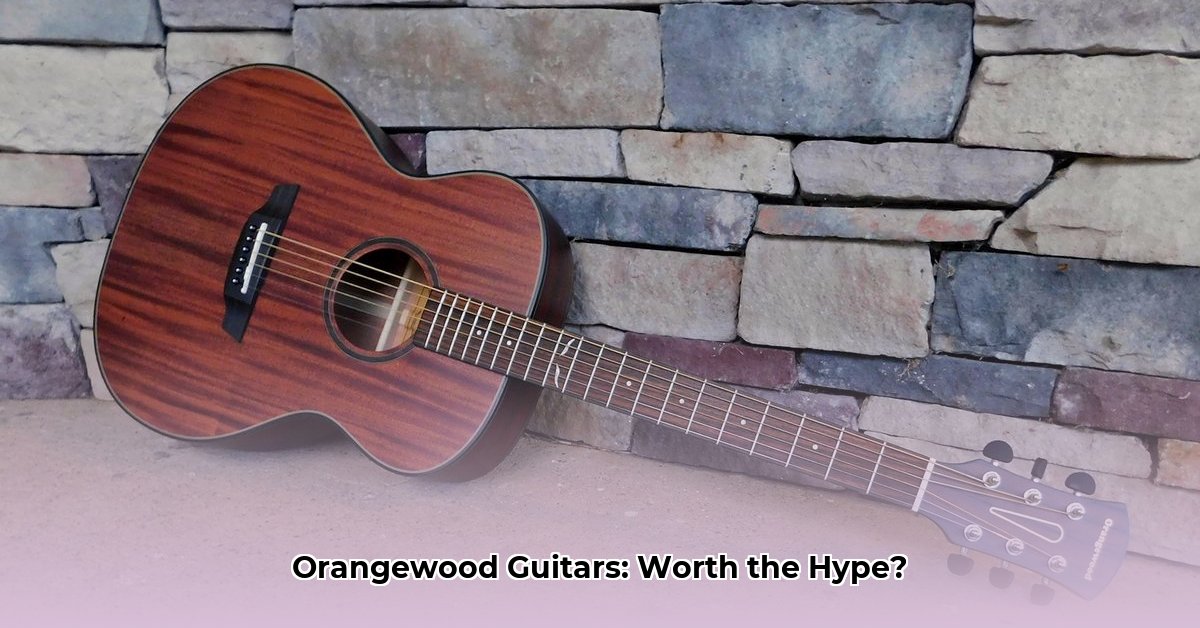
Choosing your first guitar can be overwhelming. With countless brands and models, finding the right instrument can feel like navigating a minefield. Orangewood guitars have gained popularity, particularly among beginners, but are they truly worth the investment? This review delves into Orangewood's sound, build quality, value, and overall performance, comparing them to similar guitars in the market to help you decide.
Orangewood Guitar Lineup: A Diverse Selection
Orangewood offers a broad range of instruments, including acoustic guitars, electric guitars, basses, and even ukuleles. This wide variety caters to diverse players, from beginners taking their first chords to intermediate musicians seeking a versatile instrument. However, this broad appeal raises the question: does this translate to consistent high quality across the entire lineup?
Sound Quality and Playability: A Surprisingly Pleasant Experience
Numerous reviews praise the surprisingly good sound quality of Orangewood guitars, especially considering their price point. Acoustic models often deliver a resonant, warm tone, while electric guitars offer a crisp, clear sound. Playability is another strong point; the action (string height) is generally comfortable and low, making it easier to learn chords. Intonation (the accuracy of notes across the fretboard) is often reported as being quite good. This combination of pleasing sound and comfortable playability makes practice sessions more enjoyable, particularly for beginners. Are these guitars up to the task of more demanding playing styles? Let's find out.
Build Quality and Durability: A Realistic Assessment
Orangewood's affordability is a significant selling point. However, this often comes with a trade-off in durability compared to higher-end guitars. While not likely to fall apart after minimal use, they might not withstand decades of heavy gigging like a professional-grade instrument. The materials used are sufficient for casual playing and practice, but are not typically the premium materials found in more expensive models. Orangewood guitars do come with a warranty, offering a degree of peace of mind. The length and extent of this warranty are crucial factors to consider when evaluating long-term value. Does the warranty adequately address potential durability concerns? Further investigation is needed.
Value for Money: An Excellent Entry Point
Orangewood guitars excel in offering excellent value. They provide a decent-sounding and easily playable instrument without breaking the bank. This makes them an excellent stepping stone for beginners or players on a budget. Consider them a gateway into the world of guitar playing, rather than necessarily a lifelong instrument. However, it's important to compare them to other brands at similar price points to fully understand their position in the market. How does the Orangewood value proposition compare to Yamaha's offerings or other popular budget-friendly brands? A detailed comparison would help complete the picture.
Customer Service and Warranty: Addressing Potential Concerns
Orangewood generally enjoys a positive reputation for customer service. Reviews suggest they're responsive and helpful in addressing customer issues. The inclusion of a warranty provides added security, particularly for beginners unfamiliar with instrument maintenance and potential repairs. This combination of responsive customer service and warranty coverage offers a valuable safety net to those purchasing an Orangewood guitar. Is the warranty comprehensive enough to cover common issues? The specifics should be thoroughly examined.
Comparing Orangewood to Competitors: Finding the Right Fit
How do Orangewood guitars compare to established brands like Yamaha or Squier? Direct comparisons are needed. While they may not match the premium features or longevity of higher-end instruments, the significant price difference must be considered. Orangewood occupies a specific niche in the market; the question isn't whether they are "better," but rather if they are the right instrument for your needs and expectations. What are the key differences, and which guitar ultimately provides the best value? This requires a more thorough comparative analysis.
Conclusion: Who Should Buy an Orangewood Guitar?
Are Orangewood guitars good? The answer is a qualified "yes," but it depends on your needs and expectations. They are ideal for:
- Beginners: Affordability and ease of play make them perfect first guitars.
- Budget-conscious players: They offer surprising value for the price.
- Players seeking a backup or travel guitar: Their lightweight design and relative durability are suitable for this purpose.
However, they might not be the best choice for:
- Professional musicians: More robust instruments are generally preferred for consistent professional use.
- Players expecting decades of heavy use: Higher-end guitars will typically hold up better under intense playing conditions.
Orangewood guitars successfully fill a specific niche, providing a compelling value proposition for many players. While they may not possess the longevity or premium features of high-end brands, they serve their purpose well. If you're a beginner, on a budget, or simply need a reliable backup or travel guitar, an Orangewood is likely a worthwhile purchase. However, for professional musicians or those planning for years of intense playing, investing in a higher-tier instrument may be a more suitable choice.